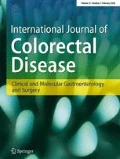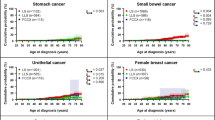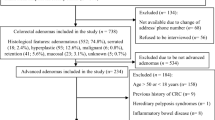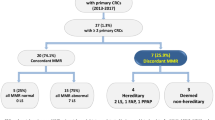Abstract
Purpose
Gallbladder diseases and cholecystectomy may play a role in the development of colorectal cancer (CRC). Our aim was to investigate the association between cholecystectomy and CRC risk overall and by sex, family history, anatomical location, and tumor mismatch repair (MMR) status.
Methods
This study comprised 5847 incident CRC cases recruited from population cancer registries in Australia, Canada, and the USA into the Colon Cancer Family Registry between 1997 and 2012 and 4970 controls with no personal history of CRC who were either randomly selected from the general population or were spouses of the cases. The association between cholecystectomy and CRC was estimated using logistic regression, after adjusting for confounding factors.
Results
Overall, there was no evidence for an association between cholecystectomy and CRC (odds ratio [OR] = 0.88, 95 % confidence interval 0.73, 1.08). In the stratified analyses, there was no evidence for a difference in the association between women and men (P = 0.54), between individuals with and without family history of CRC in first-degree relative (P = 0.64), between tumor anatomical locations (P = 0.45), or between MMR-proficient and MMR-deficient cases (P = 0.54).
Conclusion
Cholecystectomy is not a substantial risk factor for CRC, regardless of sex, family history, anatomical location, or tumor MMR status.

Similar content being viewed by others
References
Ferlay J, Soerjomataram I, Dikshit R, Eser S, Mathers C, Rebelo M, Parkin DM, Forman D, Bray F (2015) Cancer incidence and mortality worldwide: sources, methods and major patterns in GLOBOCAN 2012. Int J Cancer 136(5):E359–E386. doi:10.1002/ijc.29210
Lin OS (2009) Acquired risk factors for colorectal cancer. Methods Mol Biol 472:361–372. doi:10.1007/978-1-60327-492-0_16
Gurusamy KS, Davidson BR (2010) Surgical treatment of gallstones. Gastroenterol Clin N Am 39(2):229–244 . doi:10.1016/j.gtc.2010.02.004 viii
Barie PS, Eachempati SR (2010) Acute acalculous cholecystitis. Gastroenterol Clin N Am 39(2):343–357 . doi:10.1016/j.gtc.2010.02.012 x
Stinton LM, Shaffer EA (2012) Epidemiology of gallbladder disease: cholelithiasis and cancer. Gut Liver 6(2):172–187. doi:10.5009/gnl.2012.6.2.172
Bernstein C, Bernstein H, Payne CM, Garewal H (2002) DNA repair/pro-apoptotic dual-role proteins in five major DNA repair pathways: fail-safe protection against carcinogenesis. Mutat Res 511(2):145–178
Reid FD, Mercer PM, Harrison M, Bates T (1996) Cholecystectomy as a risk factor for colorectal cancer: a meta-analysis. Scand J Gastroenterol 31(2):160–169. doi:10.3109/00365529609031981
Chiong C, Cox MR, Eslick GD (2012) Gallstone disease is associated with rectal cancer: a meta-analysis. Scand J Gastroenterol 47(5):553–564. doi:10.3109/00365521.2012.660538
Zhao C, Ge Z, Wang Y, Qian J (2012) Meta-analysis of observational studies on cholecystectomy and the risk of colorectal adenoma. Eur J Gastroenterol Hepatol 24(4):375–381. doi:10.1097/MEG.0b013e328350f86b
Coats M, Shimi SM (2015) Cholecystectomy and the risk of alimentary tract cancers: a systematic review. World J Gastroenterol 21(12):3679–3693. doi:10.3748/wjg.v21.i12.3679
Newcomb PA, Baron J, Cotterchio M, Gallinger S, Grove J, Haile R, Hall D, Hopper JL, Jass J, Le Marchand L, Limburg P, Lindor N, Potter JD, Templeton AS, Thibodeau S, Seminara D, for the Colon Cancer Family Registry (2007) Colon Cancer Family Registry: an international resource for studies of the genetic epidemiology of colon cancer. Cancer Epidemiol Biomark Prev 16(11):2331–2343. doi:10.1158/1055-9965.epi-07-0648
Goldacre MJ, Wotton CJ, Abisgold J, Yeates DG, Collins J (2012) Association between cholecystectomy and intestinal cancer: a national record linkage study. Ann Surg 256(6):1068–1072. doi:10.1097/SLA.0b013e3182759efb
Shao T, Yang YX (2005) Cholecystectomy and the risk of colorectal cancer. Am J Gastroenterol 100(8):1813–1820. doi:10.1111/j.1572-0241.2005.41610.x
Liu B, Sweetland S, Beral V, Green J, Balkwill A, Casabonne D (2007) Self-reported information on joint replacement and cholecystectomy agrees well with that in medical records. J Clin Epidemiol 60(11):1190–1194. doi:10.1016/j.jclinepi.2007.02.007
Acknowledgments
The authors thank all study participants of the Colon Cancer Family Registry and staff for their contributions to this project.
Author information
Authors and Affiliations
Corresponding author
Ethics declarations
Funding
This work was supported by grant UM1 CA167551 from the National Cancer Institute, National Institutes of Health (NIH), and through collaborating centers: Australasian Colorectal Cancer Family Registry (U01/U24 CA097735), Mayo Clinic Cooperative Family Registry for Colon Cancer Studies (U01/U24 CA074800), Ontario Familial Colorectal Cancer Registry (U01/U24 CA074783), and Seattle Colorectal Cancer Family Registry (U01/U24 CA074794).
Seattle Colorectal Cancer Family Registry research was also supported by the Cancer Surveillance System of the Fred Hutchinson Cancer Research Center, which was funded by control nos. N01-CN-67009 (1996–2003) and N01-PC-35142 (2003–2010) and contract no. HHSN2612013000121 (2010–2017) from the Surveillance, Epidemiology and End Results (SEER) Program of the National Cancer Institute with additional support from the Fred Hutchinson Cancer Research Center. The collection of cancer incidence data used in this study was supported by the California Department of Public Health as part of the statewide cancer reporting program mandated by California Health and Safety Code Section 103885, the National Cancer Institute’s Surveillance, Epidemiology and End Results Program under contract HHSN261201000035C awarded to the University of Southern California. The ideas and opinions expressed herein are those of the author(s), and endorsement by the State of California, Department of Public Health the National Cancer Institute, or their contractors and subcontractors is not intended nor should be inferred.
This work was also supported by Centre for Research Excellence grant APP1042021 and program grant APP1074383 from the National Health and Medical Research Council (NHMRC), Australia. AKW is a NHMRC Early Career Fellow. MAJ is a NHMRC Senior Research Fellow. JLH is a NHMRC Senior Principal Research Fellow. DDB is a University of Melbourne Research at Melbourne Accelerator Program (R@MAP) Senior Research Fellow.
Disclaimer
The content of this manuscript does not necessarily reflect the views or policies of the National Cancer Institute or any of the collaborating centers in the CFRs, nor does mention of trade names, commercial products, or organizations imply endorsement by the US Government or the CFR. Authors had full responsibility for the design of the study, the collection of the data, the analysis and interpretation of the data, the decision to submit the manuscript for publication, and the writing of the manuscript.
Conflict of interest
The authors declare that they have no conflict of interest.
Rights and permissions
About this article
Cite this article
Shang, J., Reece, J.C., Buchanan, D.D. et al. Cholecystectomy and the risk of colorectal cancer by tumor mismatch repair deficiency status. Int J Colorectal Dis 31, 1451–1457 (2016). https://doi.org/10.1007/s00384-016-2615-5
Accepted:
Published:
Issue Date:
DOI: https://doi.org/10.1007/s00384-016-2615-5




